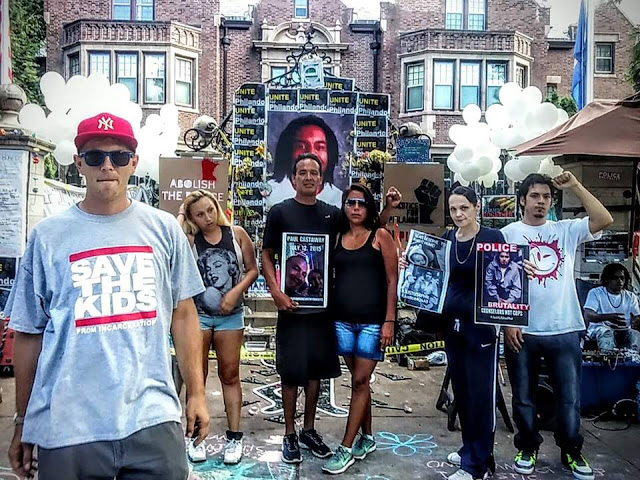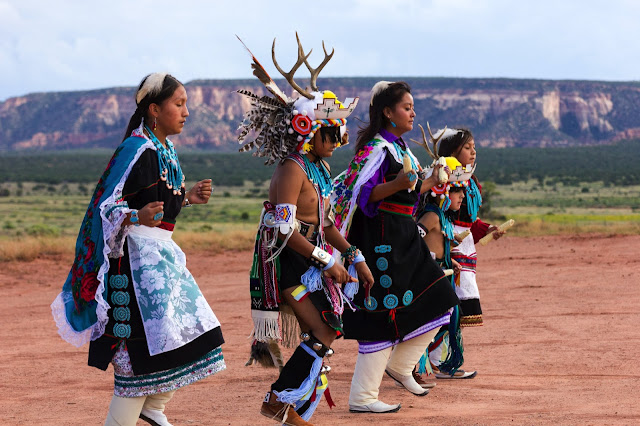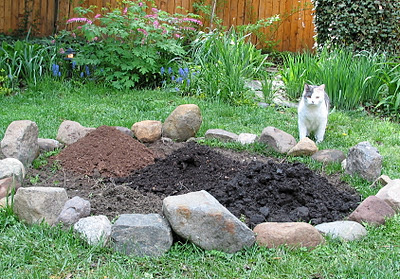Voices from the Movement for Native Lives
This story appeared on In These Times’s website in 2016. For more on topics like this, see my book, American Apartheid: The Native American Struggle....
As reported in the In These Times article “The Police Killings No One Is Talking About,” Native Americans are shot by police, or die in custody, at the highest rate of any group. Yet the general public has almost no awareness of this. Or, as Darleen Tareeq (second from right in the photo shown here) puts it, “Everyone is cool with it.” Her fiancé Philip Quinn, of the White Earth Band of Ojibwe, was shot and killed by police in September 2015.
As reported in the In These Times article “The Police Killings No One Is Talking About,” Native Americans are shot by police, or die in custody, at the highest rate of any group. Yet the general public has almost no awareness of this. Or, as Darleen Tareeq (second from right in the photo shown here) puts it, “Everyone is cool with it.” Her fiancé Philip Quinn, of the White Earth Band of Ojibwe, was shot and killed by police in September 2015.
In a recently released study of this national blind spot, Claremont Graduate University researchers Roger Chin, Jean Schroedel and Lily Rowen agree, writing that the minimal coverage of the issue indicates that Native people are ignored and their issues devalued.
As Black Lives Matter, Idle No More and other social justice movements have proliferated, Native Lives Matter has been taken up as a rallying cry by Natives grieving the loss of loved ones to police violence, as well as those calling attention to numerous other injustices—such as the routing of the Dakota Access Pipeline so as to imperil the Standing Rock Sioux Reservation’s water source, which the tribe opposes.
Here are five advocates who devote their time and energy to promoting the concept that Native Lives Matter.
Here are five advocates who devote their time and energy to promoting the concept that Native Lives Matter.
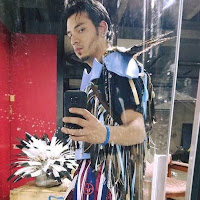 Troy Amlee, or Akicita Sunka-Wakan Ska (White Horse Soldier), shown left, is a hip-hop and dubstep musician from the Standing Rock and Cheyenne River Sioux Tribes. He and JR Bobick, a French Canadian descendant from St. Paul, Minn.—both activists with Idle No More Twin Cities—were outraged by the December 2013 police-shooting death of Cheyenne-Arapaho teen Mah-hi-vist Goodblanket. Together, they posted on Idle No More’s pages, then created the Native Lives Matter Facebook page in 2014 to document and bring awareness to the deaths.
Troy Amlee, or Akicita Sunka-Wakan Ska (White Horse Soldier), shown left, is a hip-hop and dubstep musician from the Standing Rock and Cheyenne River Sioux Tribes. He and JR Bobick, a French Canadian descendant from St. Paul, Minn.—both activists with Idle No More Twin Cities—were outraged by the December 2013 police-shooting death of Cheyenne-Arapaho teen Mah-hi-vist Goodblanket. Together, they posted on Idle No More’s pages, then created the Native Lives Matter Facebook page in 2014 to document and bring awareness to the deaths.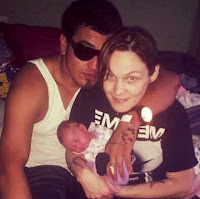 Darleen Tareeq, of White Earth and Leech Lake Ojibwe heritage, was interviewed a year to the day after police shot and killed her fiancé, Philip Quinn. The couple are shown right with their newborn daughter. Before getting on the telephone with In These Times, she, Amlee and Bobick attended a vigil for Quinn. The event included a dinner, honor songs, speeches by Quinn’s family and friends, fireworks and a traditional giveaway of gifts from the family to supporters. “It was a beautiful night,” says Tareeq.
Darleen Tareeq, of White Earth and Leech Lake Ojibwe heritage, was interviewed a year to the day after police shot and killed her fiancé, Philip Quinn. The couple are shown right with their newborn daughter. Before getting on the telephone with In These Times, she, Amlee and Bobick attended a vigil for Quinn. The event included a dinner, honor songs, speeches by Quinn’s family and friends, fireworks and a traditional giveaway of gifts from the family to supporters. “It was a beautiful night,” says Tareeq.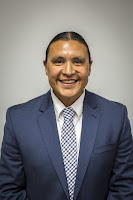 Attorney Chase Iron Eyes, left, helped raise the movement’s profile by hosting a Native Lives Matter rally in Rapid City, S.D., in December 2014 and penning a report on the subject for the Lakota People’s Law Project in 2015. A member of the Standing Rock Sioux Tribe, Iron Eyes has run for Congress from North Dakota and been a leader of the NoDAPL movement.
Attorney Chase Iron Eyes, left, helped raise the movement’s profile by hosting a Native Lives Matter rally in Rapid City, S.D., in December 2014 and penning a report on the subject for the Lakota People’s Law Project in 2015. A member of the Standing Rock Sioux Tribe, Iron Eyes has run for Congress from North Dakota and been a leader of the NoDAPL movement. In early 2015, Marlee Kanosh, of the Paiute Tribe of Utah, right, began administering the Facebook page Native Lives Taken By Police. The loss of her brother Corey in a 2012 police shooting drew her to the online community of people suffering similar tragedies, and what she describes as “a whole world of people going through the same thing for a very long time.”
In early 2015, Marlee Kanosh, of the Paiute Tribe of Utah, right, began administering the Facebook page Native Lives Taken By Police. The loss of her brother Corey in a 2012 police shooting drew her to the online community of people suffering similar tragedies, and what she describes as “a whole world of people going through the same thing for a very long time.”
HOW DO YOU DEFINE NATIVE LIVES MATTER?
Chase: It’s a movement for reclaiming our inherent spiritual dignity. Native Lives Matter is a healing and a way to move beyond what has been imposed on us for 500 years—since the arrival of Europeans. Black Lives Matter brought attention to police brutality and institutional racism, and we were very aware of that when we coined our version of the term. We want Native Lives Matter understood as expansive—including improvement in many quality-of-life issues that affect our communities, in addition to police shootings specifically. As such, it’s a comprehensive call to action for social justice reform.
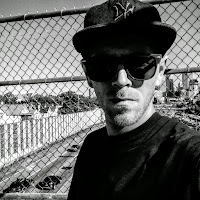 JR (shown right): The mainstream media doesn’t follow Native issues, so we base the content of our Facebook page, Native Lives Matter, on what our community wants, not on what we want as organizers. As a result of listening to the people, we have covered many subjects in addition to police brutality. The issues relate to each other. This approach has brought the page nearly 100,000 “Likes” so far.
JR (shown right): The mainstream media doesn’t follow Native issues, so we base the content of our Facebook page, Native Lives Matter, on what our community wants, not on what we want as organizers. As a result of listening to the people, we have covered many subjects in addition to police brutality. The issues relate to each other. This approach has brought the page nearly 100,000 “Likes” so far.
Troy: We have also tried to make our page a reliable source for news about the Dakota Access Pipeline, a big concern for Native people these days. As a group, we support positive issues and projects. We advocate for healthy eating and living, encourage planting of backyard gardens and hold clothing drives. We are showing up for the people.
Marlee: As administrator for the Facebook page Native Lives Taken By Police, I focus on police brutality. My posts are also very personal. In addition to research, I talk to the families, find out who the victims really were and get permission to use their photographs and other material. I have met some of the families, including Daniel Covarrubias’s mother and sister at Rise Up October in New York City in 2015. [As reported in In These Times, Lakewood, Wash., police shot and killed Covarrubias earlier that year.]
WHAT MOMENT BROUGHT YOU TO THIS ISSUE?
 Marlee: My brother Corey was shot and killed [by police] in 2012 in Millard County, Utah. There are so many questions about his death. It doesn’t add up. The medical examiner said no major organs or veins were hit, so the shots weren’t immediately fatal. It seems that he was just allowed to die. [Kanosh reportedly did not receive care after he was shot, but rather lay facedown in the dirt until morning, when his mother was notified he was dead.] Why was Corey not given medical aid? Isn’t there a law requiring this? We are citizens of this country, and we have rights. We feel lied to and betrayed. I didn’t know how to deal with this other than to use my feelings, my pain and my hurt, to be helpful—to share others’ stories. I know how the families feel when this happens.
Marlee: My brother Corey was shot and killed [by police] in 2012 in Millard County, Utah. There are so many questions about his death. It doesn’t add up. The medical examiner said no major organs or veins were hit, so the shots weren’t immediately fatal. It seems that he was just allowed to die. [Kanosh reportedly did not receive care after he was shot, but rather lay facedown in the dirt until morning, when his mother was notified he was dead.] Why was Corey not given medical aid? Isn’t there a law requiring this? We are citizens of this country, and we have rights. We feel lied to and betrayed. I didn’t know how to deal with this other than to use my feelings, my pain and my hurt, to be helpful—to share others’ stories. I know how the families feel when this happens.
Chase: In December 2014, friends and I organized a rally in Rapid City to make clear the contrast between what Natives contribute to the local economy and what we suffer. We were attending the Lakota Invitational Basketball Tournament, which brings a significant amount of money to Rapid City. In addition, the nearby Pine Ridge and Rosebud reservations have few businesses, so money from local Native residents and people living on the reservations flows directly to Rapid City business owners throughout the year. And you know the statistics—just about every quality-of-life indicator for Native people is very bad. We suffer disproportionate incarceration, and our children are taken from their families and placed in foster care far more often than non-Native children.
A local man named Allen Locke, who is Lakota, shown below, happened to attend the rally. The next day was the championship game. I went to buy Christmas gifts, and when I returned to the tournament, everyone’s Facebook timelines were going crazy with the information that cops had shot someone in a development called Lakota Homes.
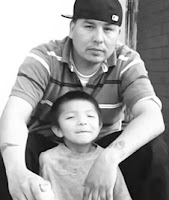 Some of us went over and learned it was Allen. His family asked us for help dealing with the police and the media. We said, “Yeah, absolutely,” and hung out to make sure they had what they needed. After that, we went to the Lakota People’s Law Project office in Rapid City, which became the base camp where we held press conferences, produced literature and got information out. I wanted to document what was occurring and wrote the report “Native Lives Matter.”
Some of us went over and learned it was Allen. His family asked us for help dealing with the police and the media. We said, “Yeah, absolutely,” and hung out to make sure they had what they needed. After that, we went to the Lakota People’s Law Project office in Rapid City, which became the base camp where we held press conferences, produced literature and got information out. I wanted to document what was occurring and wrote the report “Native Lives Matter.”
Troy: Five years ago, a lot of tokala warriors [members of a traditional warrior society] attended the funeral of my uncle Beau Little Sky, who was in AIM, the American Indian Movement. I was 19 at the time and observed that they had a consciousness about them. I was curious. I joined AIM and did homeless feeds and cop-watch patrols, which involved going around Minneapolis/St. Paul with a police scanner and listening for minority-related calls. Through cop-watching, I got involved with Occupy Minnesota and Idle No More Twin Cities. The Native Lives Matter page JR and I put together now has nine admins in Minnesota, North Dakota, South Dakota and Colorado.
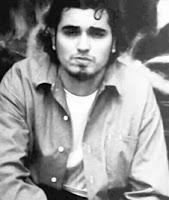 Darleen: Today is the one-year anniversary of the day my baby’s father was murdered by police. Marking that anniversary is an Ojibwe tradition, which we did at Indian Mounds, an ancient burial mound in St. Paul. There was a lot of support. Families of other victims, such as Marcus Golden, also killed in 2015, joined us. His dad is indigenous, and his mom is African American. Family members of Jamar Clark, an African-American man shot last fall, were there as well. I got involved in this grassroots Native Lives Matter group because I wanted to be part of listening to and protecting the people. Native people nationwide are being murdered at a higher rate than other people. We have been living a silent, comfortable genocide. Everyone is cool with it—us dying and our cultures being taken away.
Darleen: Today is the one-year anniversary of the day my baby’s father was murdered by police. Marking that anniversary is an Ojibwe tradition, which we did at Indian Mounds, an ancient burial mound in St. Paul. There was a lot of support. Families of other victims, such as Marcus Golden, also killed in 2015, joined us. His dad is indigenous, and his mom is African American. Family members of Jamar Clark, an African-American man shot last fall, were there as well. I got involved in this grassroots Native Lives Matter group because I wanted to be part of listening to and protecting the people. Native people nationwide are being murdered at a higher rate than other people. We have been living a silent, comfortable genocide. Everyone is cool with it—us dying and our cultures being taken away.
HOW HAS THE IDEA SPREAD?
Chase: Everywhere there are reservation bordertowns or large Indian populations, there is tension—from Oklahoma and states surrounding the Navajo Nation to rural areas of Montana and Minnesota. As the Native Lives Matter idea has grown, it has also come to include cities like L.A. and Denver. Natives everywhere have taken it over in ways that let them get out their own message.
Marlee: Without the Internet and social media, each of us would be talking to small communities. With online connections, we can talk to the larger community.
Chase: Indians are tribal people. There are few degrees of separation between any of us. We’re also highly involved Internet users, with the ability to go viral even though we’re a small percentage of the U.S. population. Tweets about opposition to the Dakota Access Pipeline were trending high on Twitter long before there was any mainstream media coverage, long before elected officials were talking about it. They live in a world that doesn’t exist anymore, a world where you had to get a TV network to cover you. That’s old school.
HOW DOES YOUR WORK AFFECT YOU?
Marlee: I have so many dreams. Every night after I do a story for the page, I dream about it. Today, opening up the page and seeing all the stories there overwhelmed me. I have done about 80 and have a couple of additional names to get to as well. I know there are even more. Being helpful makes me feel better, though. I also do a lot of praying and meditating.
ANY MORE THOUGHTS?
JR: Our Native Lives Matter page is about helping build a community.
Marlee: Through Native Lives Taken By Police, I want to help people keep their family member’s story alive. It has been important for my own family to do this, so I am doing what I can for others.
Chase: It is painfully clear that some people can’t expect justice. We Native people want to stop being ignored. In our eyes, Allen Locke gave his life for that.
